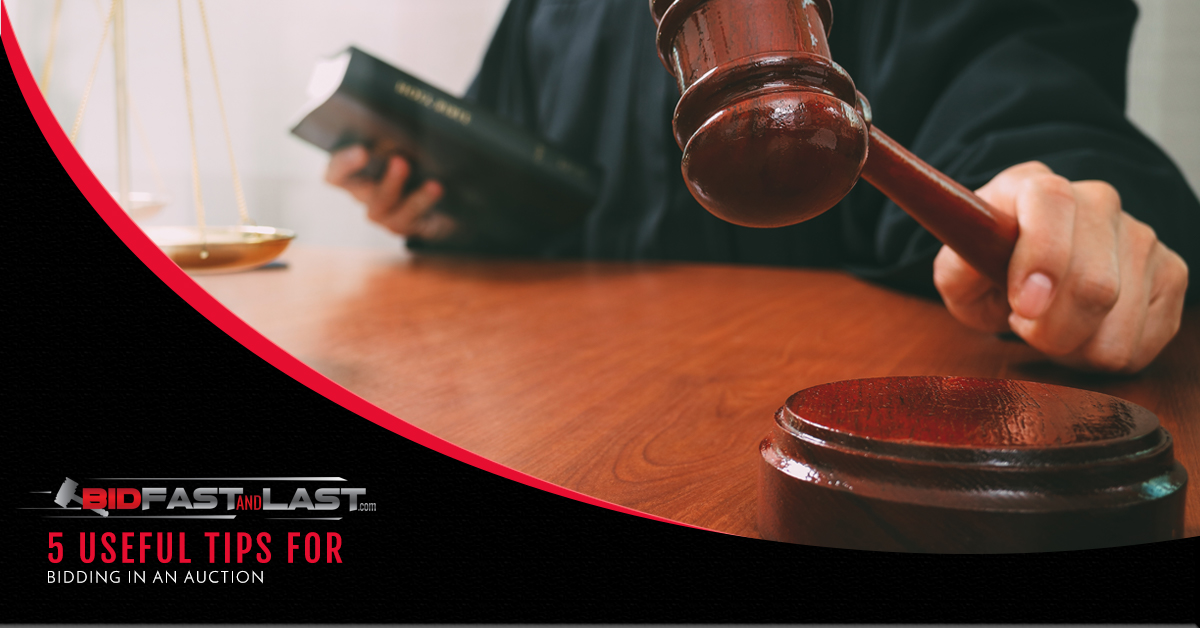5 Useful Tips If You’re Bidding In an Auction

At Bid Fast and Last®, our main priority is to provide an auction experience that’s best for all parties involved — both the client that we’re holding the auction in behalf of, and the customers who come to bid on valuable items.
With that being said, it’s important for every prospective auction-goer to be familiar with the ins and outs of auctions, because there are, in fact, many mistakes that you can make — mistakes that can result in you paying a lot more money, or not even walking out with the item you were bidding for.
It couldn’t be more important to know how to bid like a pro when you’re attending one of our auctions, which often sell highly valuable items, such as guns, vehicles, or industrial equipment. Want to improve your auction game? Keep the following things in mind next time you visit an auction house.
Inspect the Items That Are Being Auctioned
Everyone has a different standard of quality for the things they’re bidding on. When it comes to auction, it’s a “take it or leave it” scenario, since every auction is different in terms of where the items came from, the nature of the inventory, and so on. This is something you need to be aware of, because you can never count on two auctions being exactly the same.
That’s why it’s important to inspect the items yourself and get a good idea of what kind of condition they’re in. If they don’t meet your standards, you can save yourself the time and money that would have otherwise been wasted in a bidding war.
An Example: Inconsistency Across Gun Auctions
Let’s take gun auctions as an example. At Bid Fast and Last®, we often hold gun auctions because we have a Federal Firearms Licence (FFL). This allows us to legally engage in the buying and selling of firearms. Because it’s hard to find great auctioneers with a FFL, a lot of gun-owning clients come to us to get their inventory auctioned.
Because of this, we get firearms clients from all kinds of different backgrounds. It might be an aging widow who is selling her late husband’s sizable gun collection. It might be a surplus police auction. It could be an antique auction where vintage rifles are being sold.
In any case, the guns will be in different conditions depending on where they came from. The guns from the widow could have all manner of customizations and attachments if her husband was a collector. The guns from the police auction could be standard issue. The antique rifles may be missing important components but still deemed valuable.
But, if you go into any of these auctions with the wrong expectations, such as expecting modifications that retrofit antique rifles with modern stocks or magazines, you’ll be disappointed if you bid on them without taking a look..
All Bids Are Final
This point is mainly for novice bidders, but it’s very important to understand nonetheless — in any auction (or, at least, the ones we carry out in our California auction house), all bids are final. This means that you have to be positive of your ability to pay the price that you’re pitching.
Some might think that it’s a good strategy to shoot for the stars just so they’ll discourage opponents from bidding, and then take an analytical look at the situation and decide if they’re able to afford it. This is a bad move — you can’t just change your mind and hand it off to the second-place bidder. This goes against the spirit of auctions in general.
There are ways to back out of a winning bid — we’re not going to force someone to go bankrupt because they bidded irresponsibly, but there is a hefty fee that you’ll have to pay. So be confident of the numbers you’re throwing out there, because if you decide to change your mind, you’ll walk out with empty-handed, and with less money in your pocket than you had before.
Moving Costs
Another thing you need to be aware of are “hidden” costs. The costs aren’t actually hidden or secret, but there are often extra expenses when you’re bidding on high-ticket items, and these expenses aren’t bundled into the auction price that you’re bidding on. Here are some examples of costs you may end up having to pay:
- Transportation Costs: Ever been to an industrial equipment auction? If you’re picking up an industrial highway snowblower, you can’t exactly just take it out and drive home on the 15. Many vehicles, pieces of equipment, or other large items require special arrangements that could severely add up in out-of-pocket expenses.
- Holding Costs: Depending on the auction and item being sold, it might not be easy or viable to take it home the next day. However, you only have a limited time to get it out of the auction premises. Most auction houses have a defined length of time that they’ll hold an item for you until you can arrange a method of removal, but it’s going to cost you. Large equipment and vehicles take up a lot of valuable space.
Know the Buyer’s Premium
Most professional auction services have what is called a buyer’s premium that’s attached to the items that are being auctioned. A buyer’s premium is a flat percentage of the final auction price. These costs go to the auction house or service rather than the seller, and it exists as a way to help auction houses to cover the expenses that are required to host an auction.
At Bid Fast and Last®, we provide a platform through which people and organizations can sell their inventory, but they’re still the ones that are being paid when the items are bought. By charging a buyer’s premium, both the auction house and the buyer get paid.
That being said, you need to be aware that the premium exists, and how much it’s going to cost you. It’s not that big of a deal if you’re buying something for $100, but it can really add up if you’re buying, say, a $40,000 vehicle.
At Bid Fast and Last®, we charge a 10% buyer’s premium for Live Auctions, and a 15% premium for Virtual Live Auctions.
Be Confident...Or at Least Pretend to Be
Finally, a tip regarding the actual auctioning process itself — auctions are a mind game, and you don’t want to show your hand. This is important because it’s extremely easy to lose bids to people who have more money than you when they realize that they just have to surpass your spending limit. Ideally, you want everyone in the room to be convinced that you’re just made of moneybags. You want them to think that you could go all day.
That’s why you should be confident and assertive when you place bids. Once you start to falter, show hesitation, or confer with your colleagues, it’s a clear sign that you’re reaching your limit. If your opponents haven’t yet reached their limit, they will feel empowered to hike up the bidding price to a point that’s far too much for you but negligible for them.
Be confident! And if you are actually petrified and hesitant, just pretend to know what you’re doing. Fake it till you make it.
Visit Our High Desert Auction House Today
Now that you’ve been enlightened by these useful tips, it’s time to hit up nearby auctions. Do you want some of the best deals that can be found? Our auction house in the High Desert area carries out all kinds of auctions. We specialize in gun auctions, police auctions, government auctions, estate auctions, and more. Ready to become a master of bidding? Check out our current and upcoming auctions, and either stop by in person or participate online!








